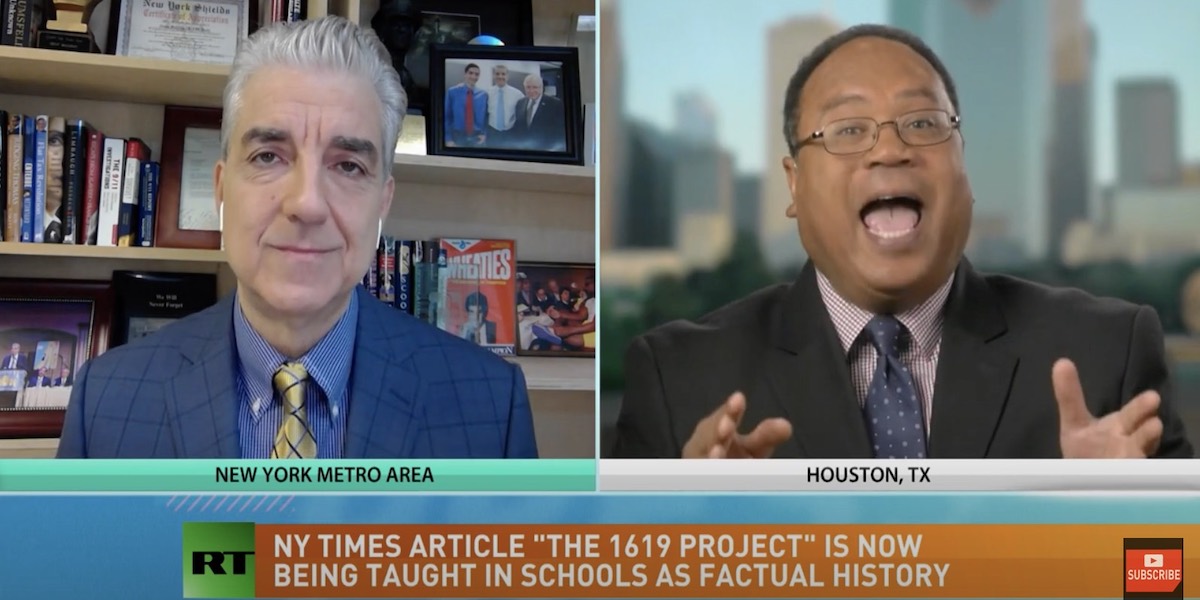
05 Aug 2020 1619 Project Rebuked for Radical, Riot-Causing Inaccuracies
Even though prominent historians have found serious discrepancies in the reporting and assertions of the New York Times’s 1619 Project, it still won staffer Nikole Hannah-Jones and the newspaper a Pulitzer Prize. Now it is being incorporated into school history curricula. And its premise that slavery and anti-black discrimination are intrinsic to the founding and evolution of America certainly helped catalyze animosity that led to recent Black Lives Matter rioting.
Project 21 Co-Chairman Horace Cooper, in an interview with Steve Malzberg on RT America’s “Eat the Press” program, said this “number of inaccuracies… [and] mischaracterizations” calls the integrity of Jones and the Times into serious question.
Disputing the premise that American history actually began with the introduction of slavery in 1619 – more than 150 years before the Revolutionary War – Horace pointed out that colonists and subsequent generations of Americans were unique to slavery only in the fact that they actually ended it in the United States:
The more realistic point is that, instead of starting “America’s history” with the arrival of slaves – which, by the way, came… not as a result of Europeans conquering countries in Africa, but because of a vibrant and thriving slave trade that happened in Africa, and which continued happening in Africa. And, by the way, into the 21st century, Africa is ground-zero for slavery.
None of their coverage discusses or understands or puts [this] in context. At the same time, America, the United States Constitution… created an amazing and exceptional idea. And within 75 years of the creation of that document, slavery was banned in all of the United States.
So this idea that this Project covers what really happened in America – this Project actually covers up what actually happened in America.
Also largely unreported is the radical nature of Jones herself.
While in college in 1995, Nicole Hannah (as she was then known) wrote a letter to a Notre Dame publication that claimed “the white race is the biggest murderer, rapist, pillager and thief of the modern world.” She also called whites “bloodsuckers,” and wrote that Christopher Columbus was “no different than Hitler.” Subsequently, she expressed pride that urban upheaval in the wake of the death of George Floyd was being called the “1619 riots.”
As the cost of the damage of the riots began to rise, Jones defended them by saying that “[d]estroying property, which can be replaced, is not violence.” Horace took exception to her radicalism:
This is amazing.
It started with her bigotry. And the whole idea of the 1619 Project is imbued with this kind of bigotry. The idea that there are hundreds – if not thousands – of Americans all across the country today who have lost their livelihoods. Property has been destroyed. The idea that should not be of consequence…
Explaining that there are significant repercussions to the rioting that will be felt for years to come, particularly in black communities where there was significant damage to businesses, Horace added:
There’s a meme going around that people have insurance. Has anybody heard of COVID-19?
A lot of folks lost their income, and they had to stop paying their insurance. Their property actually isn’t going to be replaced.
This evil idea is being promoted by the genesis [of the 1619 Project].
At the New York Times annual shareholder meeting in April, the National Center’s Project 21 and Free Enterprise Project urged the newspaper to “go back and correct the record with the same vigor with which it distorted it” and ensure school curricula is factual. But Times Publisher A.G. Sulzberger called the debate a “real value” and demurred on responsibility by saying that “we’ve tried hard… to encourage dialogue.”



